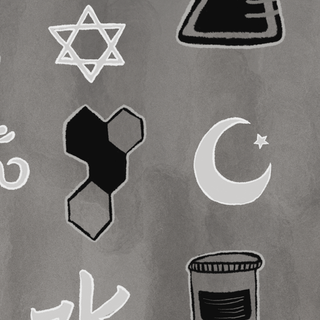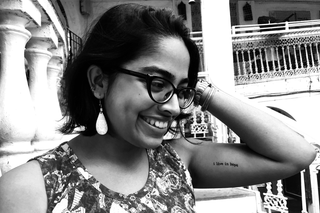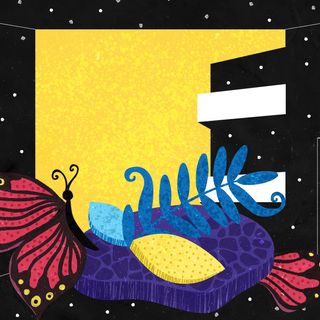
Little Big Things: A 23‑Year‑Old’s Dedication to Zero Waste
“It’s a little disappointing when you talk about it — you wonder why don’t people give a shit?”

In Little Big Things, we bring you stories of people who have rejected conformity and achieved success on their own terms.
As part of a dissertation evaluating how development causes widespread displacement of communities, T. Lalita went to Ratnagiri, Maharashtra — a port town in Western India rich in biodiversity, where the government wanted to build a refinery that locals were vehemently protesting. When she met the people on the ground, she realized what development can do, who it benefits, and who is affected by it the worst.
“It’s the adivasis, the Dalits [who are affected],” she said. “And what role do I have to play?”
Lalita had always been interested in informing and educating people, often through rants on social media. Cat videos are great, but one should use their time online to amplify their and others’ voices, she said. With an ever-present drive to teach people, she decided to take on the climate crisis, while simultaneously helping women who pick waste in her community through an NGO she consults for, Stree Mukti Sangathana.
In Thane, Mumbai, the organization gives alternative jobs to the women, such as gardening and composting, so that they stop going to toxic landfills. Lalita is currently working with the area’s municipal corporation to build a dry waste centre for the women, so they can have a safe place to sort through waste, and an opportunity to sell it for themselves. With privatization, she said, corporations are trying to encroach on this waste for their own purposes (which is technically free for all) but it has long been the domain of the women Lalita calls “waste warriors”. The process is slow, exhausting, immensely irritating, she added, when people in a position of power don’t use that power to speed up processes that are disadvantaging these women every single day.
In order to consult with the women on better waste-picking habits, however, Lalita was struck by the nature of the waste they often pick, which made her more conscious of her lifestyle. “Immediately after visiting a landfill, I saw the waste-picker women hold up pads; they told me it was horrible for them. It’s pathetic that we can just dump our sanitary waste like that,” she said. “I realised that we need to give them a safe environment to work, but that required us to understand that the waste we’re producing is handled by a human. This whole process is dehumanized – if it’s going away from your house, then it’s out of sight, out of mind. When you put a face to that waste [gathering], you realize you can become part of the change.”
Related on The Swaddle:
Little Big Things: How a 25-Year-Old Turned Stargazing Into a Sustainable Business
This realization led Lalita to adopt a zero-waste lifestyle. It’s an individual-centric approach, she said, and often, a privilege to be able to afford zero-waste options that are normally out of reach for many people. She immediately switched to a menstrual cup, which she is now comfortable using after having watched numerous BuzzFeed videos, but clarified that it’s a privilege to be able to do so, as she has access to a functional tap and a good bathroom. She replaced her soap with moong dal (mung bean) powder; she now makes her shampoo by soaking soap nuts in water the night before; and uses honey as face wash.
There is a common theme that runs through Lalita’s narration of her work – she is constantly checking her privilege. She makes sure to stress there are more qualified people working the field, who are also more adversely affected by the current situation. Her privilege lends her a voice and resources that she tries to uplift others’ experiences with, and feels uncomfortable speaking on behalf of anybody. “It’s okay if you are privileged. But what are you using that privilege for?” she asked.
“I feel like people need to realize that they are part of the problem in some way, move past it, and start demanding more from the system — the government and other stakeholders,” she said of the climate crisis, which she tries to spread awareness amongst her peers about. “It’s something we all need to panic about. When I see people saying something very callous, it first angers me. Then I ask if they are beyond reform. If they are, then screw it. If you can talk to them, then I try to engage.”
You see, the Prime Minister may have the privilege of saying that climate change is a state of mind, she said cheekily. “But we don’t.”
Individual changes, however, cannot do much to stop the crisis, she said. Capitalism as a system makes us feel individuals are to blame, that we are solely responsible, but the system is the problem, she added. NGOs, for example, can be as exploitative as big corporations. Activists work with low pay, a high work load, and a dangerous risk of burn out, she added. Sometimes, she feels she wants to remove herself from the work, go buy a plot of land in a village, and do organic farming.
“But that also comes with privilege. I can remove myself from this. I have the money, the knowledge,” she said. “But if I want that for myself, then why can’t we envision that for the entire world?”
Rajvi Desai is The Swaddle's Culture Editor. After graduating from NYU as a Journalism and Politics major, she covered breaking news and politics in New York City, and dabbled in design and entertainment journalism. Back in the homeland, she's interested in tackling beauty, sports, politics and human rights in her gender-focused writing, while also co-managing The Swaddle Team's podcast, Respectfully Disagree.
Related


Small Talk: Best Friends
